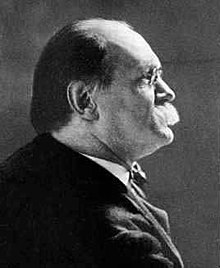Sam Loyd
| Sam Loyd | |
|---|---|
 |
|
| Born |
Samuel Loyd January 30, 1841 Philadelphia, United States |
| Died | April 11, 1911 (aged 70) |
| Known for | Chess, puzzles, mathematical games |
Samuel Loyd (January 30, 1841 – April 10, 1911), born in Philadelphia and raised in New York City, was an American chess player, chess composer, puzzle author, and recreational mathematician.
As a chess composer, he authored a number of chess problems, often with interesting themes. At his peak, Loyd was one of the best chess players in the US, and was ranked 15th in the world, according to chessmetrics.com.
He played in the strong Paris 1867 chess tournament (won by Ignatz von Kolisch) with little success, placing near the bottom of the field.
Following his death, his book Cyclopedia of 5000 Puzzles was published (1914) by his son. His son, named after his father, dropped the "Jr" from his name and started publishing reprints of his father's puzzles. Loyd (senior) was inducted into the US Chess Hall of Fame.
Loyd is widely acknowledged as one of America's great puzzle-writers and popularizers, often mentioned as the greatest. Martin Gardner featured Loyd in his August 1957 Mathematical Games column in Scientific American and called him "America's greatest puzzler". In 1898 "The Strand" dubbed him "the prince of puzzlers". As a chess problemist, his composing style is distinguished by wit and humour.
However, he is also known for lies and self-promotion, and criticized on these grounds—Martin Gardner's assessment continues "but also obviously a hustler". Canadian puzzler Mel Stover called Loyd "an old reprobate", and Matthew Costello called him "puzzledom's greatest celebrity ... popularizer, genius", but also "huckster ... and fast-talking snake oil salesman".
...
Wikipedia
